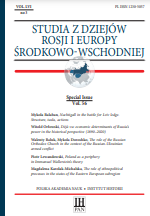Russian–Prussian surrender of fugitives and deserters: cartel conventions of the 1840s and 1850s
Russian–Prussian surrender of fugitives and deserters: cartel conventions of the 1840s and 1850s
Author(s): Marek RutkowskiSubject(s): Diplomatic history, Military history, 19th Century
Published by: Instytut Historii im. Tadeusza Manteuffla Polskiej Akademii Nauk
Keywords: Russia; Prussia; extradition; bilateral treaties; nineteenth century;
Summary/Abstract: As early as in 1832, dedicated facilities for the exchange of fugitives (which had not been in operation during the Polish-Russian War of 1831) were re-established in the Kingdom of Poland, including, of course, on the Prussian border. In the spring of 1832, Field Marshal Paskevich ordered that a special “instruction for officers charged with the exchange of fugitives at border post stations” be drawn up and implemented. After the termination of the Russian-Prussian cartel convention of 17/29 March 1830, a new extradition treaty was concluded between the two countries on 8/20 May 1844. Later still, another Russian-Prussian cartel agreement was signed on 27 July / 8 August 1857. Both treaties strongly emphasise such issues as the limitations for prosecuting desertion or escape, the procedures for having deserters transported to a third country and, finally, the establishment of standing commissioners whose task was to resolve contentious issues and maintain “good neighbourly relations”. It appears that the Russian-Prussian extradition treaties of the 1840s and 1850s - despite the provisions concerning expulsion of “undesirable” persons - were free from overt political references.
Journal: Studia z Dziejów Rosji i Europy Środkowo-Wschodniej
- Issue Year: 56/2021
- Issue No: Sp.
- Page Range: 5-39
- Page Count: 35
- Language: English

